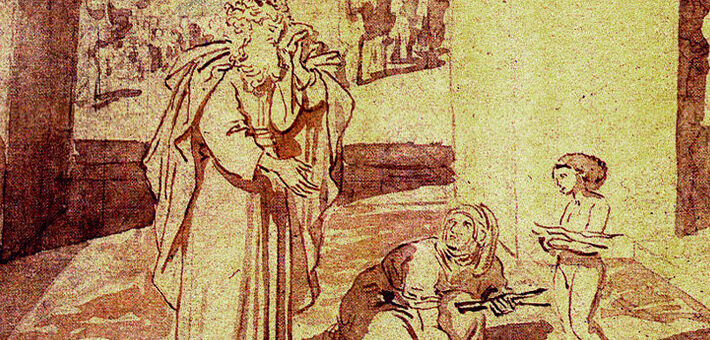Commentary on Psalm 30
Because I am a Psalms scholar, I am always on the lookout for where and when the Psalms show up, whether it be in worship or in the public arena.
While preparing to write this essay, I heard Psalm 30:5b quoted twice. First, on the morning after the 2016 Iowa Caucuses, one of the four or five self-declared “winners” commented on his “victory” by proclaiming, “Weeping may linger for the night, but joy comes with the morning.” Second, I heard a sermon preached on John 11:28-44 by a pastor, who was very active in the protests in Ferguson, MO following the shooting death of Michael Brown, Jr., and who remains active in the “Black Lives Matter” movement. Focusing particularly on John 11:35 (“Jesus wept.”), he suggested that a primary role of pastors nowadays is to weep with victims of injustice and violence in Ferguson and elsewhere. But, he added, “Weeping may linger for the night, but joy comes with the morning.”1
The contrast between these two episodes involving Psalm 30 is instructive. In the first instance, a powerful and prosperous politician adopts Psalm 30:5b to celebrate something that he perceives has contributed to his increasing good fortune. In the second instance, Psalm 30:5b is cited on behalf of victims of persistent injustice, in order to articulate hope in the midst of current and ongoing struggle. Which of the two episodes represents a more faithful use of Psalm 30? At first glance, it might seem to be the first (although the psalmist was in a life-threatening situation, unlike the politician in question — see vv. 3, 9). As in other psalms of thanksgiving, the psalmist seems to have left setback and suffering behind — “you have drawn me up” (v. 1), “you have healed me” (v. 2), “you brought up my soul from Sheol” (v. 3), “you have turned my mourning into dancing” (v. 11). It seems that everything from here on will be onward and upward — joyful celebration and dancing (vv. 5, 11).
But not so fast! While such a triumphalistic reading of Psalm 30 is attractive, there are reasons to pause. James L. Mays suggests that it is possible to hear Psalm 30 much too simplistically — that is, it is possible to conclude that Psalm 30 suggests that if we pray fervently for help, we will be delivered, and suffering will be a thing of the past. But such confidence seems to be dangerously close to the false confidence described in v. 6. Given this recognition, plus the fact that the faithful pray-ers of the psalmic prayers are regularly beset by opposition and immersed in suffering, it is not likely that the psalmist’s experience led him or her to conclude that he or she would never again have to suffer.
Rather, what the psalmist has learned is that God is “my helper” (v. 10) in every experience of life, including life’s worst. This being the case, praise and thanksgiving (see vv. 4, 9, 12) become more than momentary responses to deliverance and good fortune. In essence, they become a way of life. As Mays puts it:
Praise is the way the faithfulness of the LORD becomes word and is heard in the LORD’s world (v. 9). For people, it is the language of joy and gladness that goes with life and is life in contrast to the silence of death (v. 12). And salvation is here understood as reaching its goal, not just in the restoration of the needy, but finally in the praise of God.2
Because to live is to praise, and to praise is to live, the second episode described above seems more closely to represent the psalmist’s experience — that is, the experience of joy, praise, and gratitude (vv. 4, 5b, 11-12) in the midst of whatever life may bring, including current and ongoing struggle.
For the psalmist, the silence of death (see “not be silent” in v. 12) is not the final word. God’s life-giving power is ultimately determinative of his or her existence. The psalmist’s hope, if we were to transpose it into Christian terms, might be called something like “resurrection-power” (see the Old Testament and Gospel Lessons for the day — 1 Kings 17:17-24 and Luke 7:11-17). To affirm our faith in the resurrection does not mean that we will avoid struggle and suffering. Indeed, faithfulness to God regularly evokes opposition and suffering; and it is faith in the resurrection that empowers us to bear the cross (see Mark 8:34). Perhaps this is what the author of Hebrews means when he describes Jesus as “the pioneer and perfecter of our faith, who for the sake of the joy that was set before him endured the cross” (Hebrews 12:2).
In Luke 6:21, we hear the same trust in the ultimate triumph of life as God intends it. Luke’s version of Jesus’ Beatitudes includes, “Blessed are you who weep now, for you will laugh.” The influence of Psalm 30:5b is evident. Echoing the psalmist, Jesus proclaims hope and promises life in the midst of current and ongoing struggle.
Psalm 30:9 is often interpreted as the psalmist’s appeal to God’s self-interest (see Psalms 6:5; 88:10-12) — that is, God will have one less worshipper if the psalmist dies. Perhaps this interpretation is correct; however, I prefer to hear v. 9 primarily as an expression of the psalmist’s deep appreciation for God’s gift of life, along with his or her commitment to live for God. And as the psalmist has come to understand, amid tears or triumph, to live for God will mean to “give thanks to you forever” (v. 12). To live is to praise God, and to praise God is to live.
Notes:
1 Rev. Osagyefo Sekou, a sermon preached in the Wehrli Chapel, Eden Theological Seminary, Webster Groves, MO, Feb. 25, 2016.
2 James L. Mays, Psalms (Interpretation: A Bible Commentary for Teaching and Preaching; Louisville: John Knox Press, 1994), 141; emphasis added.


June 5, 2016